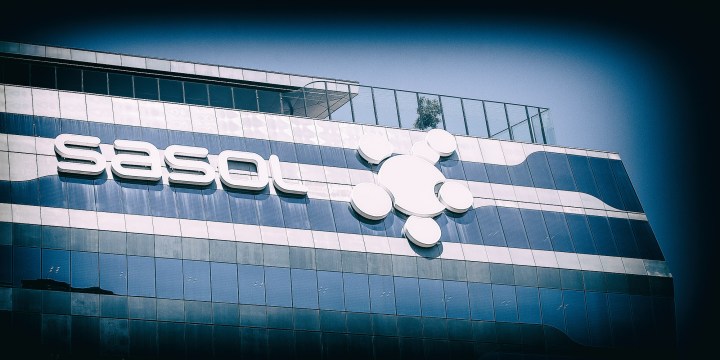BUSINESS MAVERICK
Sasol’s perfect storm

Amid a global economic crisis, Sasol is facing its own perfect storm. The petrochemical firm has faced down challenges in the past and will no doubt do so again, but questions need to be asked about management’s role in all of this.
On 4 March, a day before Sasol’s share price nosedived, the board of directors saw fit to approve a further R70-million worth of long-term share incentives (LTI) for the senior management team.
The shares, issued at a price of R192.83, are now worthless given that the share is trading at about R50.00 following the rout in the oil markets, but that is arguably irrelevant.
The point is that poor capital allocation and poor project execution, coupled with sizeable exogenous shocks have combined to create the company’s biggest crisis yet.
Yet the board and the remuneration committee have opted to continue with LTI programmes rather than suspend them as a result of Sasol’s poor performance.
Rich rewards to Sasol executives regardless of poor capital allocation decisions are not new. The acquisitions of Condea in Europe 2010 and the Montney Shale fields in Canada in 2011 cost the company and shareholders dearly, yet these decisions did not affect incentives paid to executives at the time.
Similarly, the delays and cost overruns on the Lake Charles Chemical Project have had a limited impact on executives’ short-term incentives and no impact on long-term incentives.
“Long-term incentives for 2018 were calculated on Sasol’s return on invested capital which specifically excludes assets under construction,” says Terence Craig, CIO at Element Investment Managers.
This may also rankle with shareholders who like to think that management interests are aligned with theirs.
“If you bought shares at the beginning of the 2018 financial year and held on to the end of F2019, you would have lost money. Yet directors scored in F2018 and did not have to pay anything back in F2019, putting them in a better position than shareholders.”
Sasol’s debt has spiralled out of control — debt is now 35 times the company’s market capitalisation — and management has announced a package of measures to both conserve cash (by cutting capex) and raise cash by way of asset sales and a $2-billion rights issue.
The debt was incurred during the development of Sasol’s ambitious Lake Charles Chemical Project, the brainchild of David Constable, who earned more than R500-million as CEO of Sasol between 2011 and 2016.
When the project was announced in 2012 it was budgeted at $6-billion, however from the outset problems and costs were allowed to balloon.
“We are… disappointed by… cost and schedule overruns on LCCP…” Sasol co-CEO’s Bongani Nqwababa and Stephen Cornell said in February 2019 at the presentation of Sasol’s interim results. This is “a lesson from which we have gained invaluable insights…”
Three months later, in May, projected costs had escalated from $11.6-billion to $12.6-billion. So much for “invaluable insights”.
Almost 70% of the cost of the project is funded in dollars. This debt, which has spiralled from R140-billion in January to R190-billion currently, was to be funded by cash flows from Lake Charles. But project delays mean that this cash is not yet flowing, placing the burden of maintaining the interest repayments largely on the SA business.
Adding to Sasol’s woes, the lower oil price coupled with the slowdown in production and sales in the wake of the Covid-19 lockdown will reduce earnings, which means that come the June year-end, Sasol’s net debt in relation to earnings (before accounting treatments) will be worse than anticipated.
“Sasol is very likely to breach its debt covenants in June,” says Craig. “This will mean their bankers will have them over a barrel and decisions on the structure of the balance sheet will be out of their hands. This situation benefits the bankers and no one else.”
While the macro-conditions do not favour Sasol, analysts believe the CEO is the right man for the job.
However, Sasol’s CEO Fleetwood Grobler, who took the reins in October 2019, is confident that this can be avoided.
The company is in talks with its bankers to renegotiate covenant terms.
It has also hedged itself against oil price fluctuations below $32 a barrel.
“Sasol has sailed into a perfect storm with a highly leveraged balance sheet as it hit its peak spending period,” says Meryl Pick, portfolio manager and analyst at Old Mutual Equities. “This is putting downward pressure on the share price. However, we believe the market is discounting the levers that Sasol has at its disposal.”
Pick believes Sasol’s funders will agree to adjust the debt-to-profit ratios that Sasol is expected to maintain. “Yes we have pressed pause in the industry, but once demand returns Sasol will be able to meet its repayments and cash flows from the US operation should begin from December. The banks will probably charge a higher price for this, but there is room to take a higher borrowing cost.”
However, Sasol’s bondholders are less optimistic than equity holders. “Sasol’s bonds are trading at 60c on $1, which tells us that investors are not confident about getting back the full value of their investment,” says Hannes van den Berg, co-head of SA equity and Multi Asset at Ninety One.
While the macro-conditions do not favour Sasol, analysts believe the CEO is the right man for the job.
“He knows the business inside out and he is doing what it takes to avoid or minimise the rights issue,” Van den Berg says.
Yes short-term events have resulted in indiscriminate selling of Sasol shares, but this has provided Old Mutual with an opportunity to remain invested in a great company at attractive prices, says Pick.
“Markets, by their nature, go through cycles, with the severity and duration directly related to the cause for the downturn. In the case of Sasol, Covid-19 and the oil price war were an event-driven cycle, which meant it would eventually pass,” she says.
That said, most would-be investors, Old Mutual included, will remain on the fence until there is further clarity on the rights issue.
The rights issue is likely to be material. Even a $2-billion issue is more than the current market value of the company. This means that shareholders who follow their rights will need to allocate double the capital in their portfolio just to maintain their current position, while those who don’t will find themselves diluted by 50% or more, depending on the offer price.
Sasol has been sucked into a vortex of events beyond management and board control. But the fact that the company was so ill prepared to face these events is something that management and the board should be held accountable for. BM


















 Become an Insider
Become an Insider